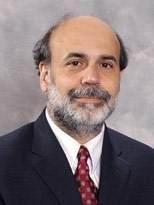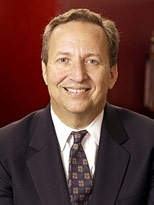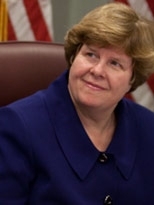American presidents have famously raided universities to build their policy teams. President John F. Kennedy sought foreign policy advisors from his alma mater, Harvard. President Ronald Reagan relied on economists steeped in the laissez-faire school of thought from the University of Chicago.
President Barack Obama has tapped a number of MIT-trained economists to craft a response to the worst economic downturn in generations. These economists represent no particular ideology or canon. Instead, they reflect the eclectic, practical approach of the Institute's Department of Economics.
James Poterba, the Mitsui Professor of Economics, former head of the MIT Department of Economics, and president of the National Bureau of Economic Research, says the MIT crew is part of a "dream team of economic advisors" in the Obama administration.
"They are realists and pragmatists who are looking for what will work to address the particular problems we are facing," Poterba says. "I think these folks are very much problem solvers in the MIT tradition."
"Of course," he adds, "on the economic front, they have lots of problems to solve."
'Dream team'
MIT's Department of Economics has trained many leading central bankers. In addition to U.S. Federal Reserve Board Chairman Ben Bernanke PhD '79, the bankers with MIT ties include Mario Draghi PhD '77, governor of the Bank of Italy, Stanley Fischer PhD '69, an emeritus member of the MIT faculty and governor of the Bank of Israel, José de Gregorio PhD '90, governor of the Central Bank of Chile, and Athanasios Orphanides '85, PhD '90, governor of the Central Bank of Cyprus.
In Washington, Lawrence H. Summers '75, former secretary of the Treasury and Harvard University president, leads President Obama's National Economics Council. Christina Romer PhD '85 heads the Council of Economic Advisors while Austan Goolsbee PhD '95, who served as Obama's senior economics advisor during the campaign, has been nominated to serve as a member of the Council of Economic Advisers and is chief economist of the President's Economic Recovery Advisory Board. Harvard economics professor Jeremy Stein PhD '86 is a special advisor to the secretary of the Treasury. Additionally, Xavier de Souza Briggs, associate professor of sociology and urban planning in the Department of Urban Studies and Planning, has joined the administration as associate director of the White House Office of Management and Budget.
The MIT-trained economics appointees bring different skills and points of view, following no single "party line," says Robert Solow, Institute Professor emeritus. Their primary strength lies in their ability to deal with data without a lot of presupposition, he says.
"They have all been very productive in research and every one has been concerned with economic problems that are closely related to policy issues," Solow says.
Problem solvers
Romer, an economic historian and macroeconomist, has studied the causes of the Great Depression and the effect of U.S. monetary and tax policies on the recovery from that economic disaster. "Her research positions her very well to tackle the problem of designing an economic stimulus package for an economy that is sputtering," Poterba says.
Summers' research spans both microeconomics and macroeconomics, which gives him a broad range that is especially helpful in handling the many issues that come before the NEC. More importantly, as Treasury secretary under the Clinton administration and as a World Bank economist, Summers has had a hands-on role in addressing world economic crises, such as the Mexican monetary crisis of 1984 and the Russian market crises of 1998, Poterba says. "He has a tremendous amount of experience at trying to fashion policy remedies for the kind of crises we're experiencing."
Goolsbee is known for his research on how tax policy affects the behavior of high-income households -- a topic likely to be central to tax and budget discussions after the current economic downturn abates. Stein's academic research focuses on corporate finance and financial intermediation.
While some observers have characterized the Obama economists' ideology as Keynesian (in reference to John Maynard Keynes, who championed greater government spending as a way to lift an economy out of recession), Solow says that is only because the economic field has been almost monolithically anti-Keynesian in recent decades. He prefers to characterize the group as "eclectic Keynesians."
Certainly, most economists have some ideological tilt, Poterba says. "There are some people who would never, ever consider nationalizing a bank. There are others who are prepared to consider that," he says. "I don't think [the MIT-trained economists] are going to stand on ideological principle. If they think something is going to work, they're going to try it."
Which is, he notes, no guarantee of success in the face of tough economic problems that have caught many economists by surprise. "This is not like baking a cake where if you just follow all the recipe directions, it is supposed to turn out perfectly," Poterba says. "We're not quite sure what works in this situation."
A version of this article appeared in MIT Tech Talk on March 18, 2009 (download PDF).
President Barack Obama has tapped a number of MIT-trained economists to craft a response to the worst economic downturn in generations. These economists represent no particular ideology or canon. Instead, they reflect the eclectic, practical approach of the Institute's Department of Economics.
James Poterba, the Mitsui Professor of Economics, former head of the MIT Department of Economics, and president of the National Bureau of Economic Research, says the MIT crew is part of a "dream team of economic advisors" in the Obama administration.
"They are realists and pragmatists who are looking for what will work to address the particular problems we are facing," Poterba says. "I think these folks are very much problem solvers in the MIT tradition."
"Of course," he adds, "on the economic front, they have lots of problems to solve."
'Dream team'
MIT's Department of Economics has trained many leading central bankers. In addition to U.S. Federal Reserve Board Chairman Ben Bernanke PhD '79, the bankers with MIT ties include Mario Draghi PhD '77, governor of the Bank of Italy, Stanley Fischer PhD '69, an emeritus member of the MIT faculty and governor of the Bank of Israel, José de Gregorio PhD '90, governor of the Central Bank of Chile, and Athanasios Orphanides '85, PhD '90, governor of the Central Bank of Cyprus.
In Washington, Lawrence H. Summers '75, former secretary of the Treasury and Harvard University president, leads President Obama's National Economics Council. Christina Romer PhD '85 heads the Council of Economic Advisors while Austan Goolsbee PhD '95, who served as Obama's senior economics advisor during the campaign, has been nominated to serve as a member of the Council of Economic Advisers and is chief economist of the President's Economic Recovery Advisory Board. Harvard economics professor Jeremy Stein PhD '86 is a special advisor to the secretary of the Treasury. Additionally, Xavier de Souza Briggs, associate professor of sociology and urban planning in the Department of Urban Studies and Planning, has joined the administration as associate director of the White House Office of Management and Budget.
The MIT-trained economics appointees bring different skills and points of view, following no single "party line," says Robert Solow, Institute Professor emeritus. Their primary strength lies in their ability to deal with data without a lot of presupposition, he says.
"They have all been very productive in research and every one has been concerned with economic problems that are closely related to policy issues," Solow says.
Problem solvers
Romer, an economic historian and macroeconomist, has studied the causes of the Great Depression and the effect of U.S. monetary and tax policies on the recovery from that economic disaster. "Her research positions her very well to tackle the problem of designing an economic stimulus package for an economy that is sputtering," Poterba says.
Summers' research spans both microeconomics and macroeconomics, which gives him a broad range that is especially helpful in handling the many issues that come before the NEC. More importantly, as Treasury secretary under the Clinton administration and as a World Bank economist, Summers has had a hands-on role in addressing world economic crises, such as the Mexican monetary crisis of 1984 and the Russian market crises of 1998, Poterba says. "He has a tremendous amount of experience at trying to fashion policy remedies for the kind of crises we're experiencing."
Goolsbee is known for his research on how tax policy affects the behavior of high-income households -- a topic likely to be central to tax and budget discussions after the current economic downturn abates. Stein's academic research focuses on corporate finance and financial intermediation.
While some observers have characterized the Obama economists' ideology as Keynesian (in reference to John Maynard Keynes, who championed greater government spending as a way to lift an economy out of recession), Solow says that is only because the economic field has been almost monolithically anti-Keynesian in recent decades. He prefers to characterize the group as "eclectic Keynesians."
Certainly, most economists have some ideological tilt, Poterba says. "There are some people who would never, ever consider nationalizing a bank. There are others who are prepared to consider that," he says. "I don't think [the MIT-trained economists] are going to stand on ideological principle. If they think something is going to work, they're going to try it."
Which is, he notes, no guarantee of success in the face of tough economic problems that have caught many economists by surprise. "This is not like baking a cake where if you just follow all the recipe directions, it is supposed to turn out perfectly," Poterba says. "We're not quite sure what works in this situation."
A version of this article appeared in MIT Tech Talk on March 18, 2009 (download PDF).









